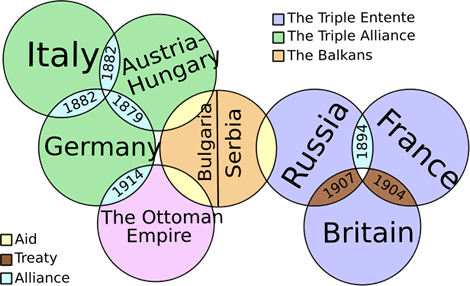 |
| Alliance System |
Alliances are a common military or political action among states. Often resorted to for defensive purposes, they frequently result in the very war they hoped to avoid. When Sparta formed the Peloponnesian League and Athens led the Delian League in the aftermath of the Persian War, war followed, and it was long and costly. Likewise, the alliance system that emerged in the years before World War I proved to be a major cause of one of the greatest conflagrations in human history.
The roots of the modern alliance system lie in the situation that arose following the victory of Prussia in its war with France in 1870–71. Since the 1860s the Prussian chancellor Otto von Bismarck had waged wars with Denmark and Austria, which led to territorial acquisitions.
With the Franco-Prussian War came the unification of Germany, which then took two provinces, Alsace and Lorraine, from France. One of the major consequences of these events was a change in the balance of power as Germany replaced France as Europe's greatest nation.

With this in mind, Bismarck devised the Three Emperors' League in 1873, which tied together the conservative empires of Germany, Russia, and Austria-Hungary. Even after signing the Dual Alliance with Austria-Hungary in 1879, he attempted to contain Russia in the Reinsurance Treaty of 1887.
Following Bismarck's removal from office in 1890, Germany allowed the Reinsurance Treaty to lapse, as it appeared that Russia and Austria-Hungary were incompatible partners. Russian ambitions in the Balkans, fanned by Pan-Slavism, came into conflict with Austria-Hungary's need to control these areas for the sake of its own national integrity.
Thus, Russia was motivated to sign a treaty with France in 1894 to gain its assistance in the east. This created the possibility of a two-front war for Germany. It should also be noted that both France and Germany found themselves linked to eastern powers whose quarrel did not directly involve their national interests.
In these circumstances, it was natural for Britain to be taken into consideration, despite the fact that Britain had a history of maintaining its distance from the continent and eschewing treaties. From the German point of view, there were two positive scenarios.
The first would be for Britain to maintain neutrality; the second and best option would be for Britain to become a German partner. At the same time Russia and France hoped that Britain would become an ally and add British naval strength to their arsenal of weapons. The contest for British support was to become one of the most important issues around the turn of the century.
Germany made critical mistakes in dealing with Britain. In the first place, they seem to have believed that Germany needed to do nothing to woo Britain, for eventually Britain would be forced to side with Germany because of the former's differences with France and Russia. There was a tradition of war with both, and Britain had important rivalries with France in Africa and Russia over India and Afghanistan.

The idea that Germany would challenge its predominance spurred Britain to embark on its own naval building program, resulting in a naval race. More significantly, it prompted Britain, to the surprise of Germany, to reconsider its isolation and enter into conversations with France in 1904 and Russia in 1907. Both concluded in the resolution of their colonial differences and the inauguration of military contacts.
What had occurred was not an alliance between the three; rather, Britain had established friendly relations with the other two. Thus, this relationship became known as the the Triple Entente.
This outcome, of course, now forced Germany to plan not only for a two-front war but for a war in which Britain might intervene on the side of its opponents. Moreover, it now became clear that Italy, the third member of the Triple Alliance, could not be counted on to support Germany and Austria-Hungary.
The result of all of this was the development of the Schlieffen Plan, by which Germany hoped to score a decisive victory over Russia and France before Britain could intervene. This plan committed Germany to a timetable that was very hard to alter once a decision was made. Thus, it led to the violation of Belgian neutrality, which assured that Britain would come to Belgium's assistance.
The crisis in the Balkans caused by the assassination of Archduke Franz Ferdinand in 1914 led to a confrontation between Russia and Austria-Hungary over Serbia. Faithful to its treaty commitments, France supported Russia, while Germany backed Austria-Hungary.
When German armies entered Belgium, Britain entered the war. The alliance system ensured that a chain reaction would take place as countries arrayed themselves against each other. In many ways it provoked the war it was intended to prevent.